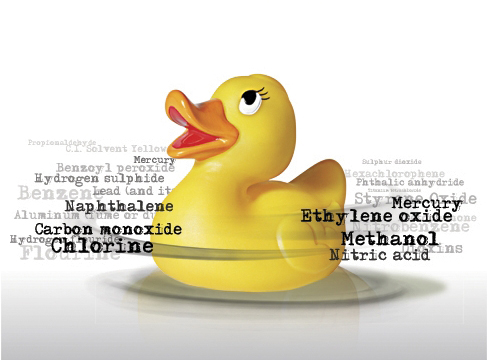In Toxic Trespass, writer and director, Barri Cohen (BA 1984 Innis) investigates the health effects of the murky toxic soup that surrounds us and what corporations and various levels of governments are doing to protect Canadians from them. The unsettling answer is “not nearly enough.”
In the last 50 years, tens of thousands of often unregulated chemicals have been introduced into our air, water, food and consumer goods. Of greatest concern to Cohen is that children’s growing bodies are most susceptible to these pollutants, many of which we know little or nothing about. “No known safe levels” becomes her refrain throughout the documentary.
Cohen’s interest in the subject became personal in 2006 when her 10-year-old daughter’s blood was tested for chemicals as part of an Environmental Defence campaign. The results were alarming, and yet typical of what you’d find in any young urban Canadian today: traces of heavy metals, carcinogens and even the long-banned pesticide DDT. These chemicals have been linked to learning disabilities, asthma, behavioural issues, childhood cancer and even altered DNA.
While there is growing scientific evidence of the connection between illness and pollutants, government research is incomplete at best. Cohen asks why Canada isn’t more aggressively seeking answers, and solutions. She meets independent researchers who persist at connecting the dots between what they call “excess” deaths and hospitalizations and our increasingly toxic environment, but representatives from Health Canada and the polluting industries would not be interviewed for this film. (Cohen learns that Health Canada suppressed a study linking pollution to disproportionate death and illness rates in Windsor, Ontario, saying that it would cause “hysteria.”) She suggests this dubious government strategy isn’t accidental. After all, if there are no known safe levels for a chemical, then neither industry nor government needs to deal with the repercussions of toxic emissions.
The documentary raises chilling questions about the toxic effects of Canadians’ industrialized lifestyle, and about how effective our federal government is at protecting the public interest when in conflict with the powerful industries for whom polluting is just a part of doing business.
Recent Posts
U of T’s Feminist Sports Club Is Here to Bend the Rules
The group invites non-athletes to try their hand at games like dodgeball and basketball in a fun – and distinctly supportive – atmosphere
From Mental Health Studies to Michelin Guide
U of T Scarborough alum Ambica Jain’s unexpected path to restaurant success
A Blueprint for Global Prosperity
Researchers across U of T are banding together to help the United Nations meet its 17 sustainable development goals






2 Responses to “ Toxic Trespass ”
The film mentions a centre that tests the body for toxins while using regular products and then again after using clean products. Where can a Canadian in Windsor, Ontario, easily obtain this type of testing?
@Mary: You'd need to contact Environmental Defence Canada, which arranged the tests.